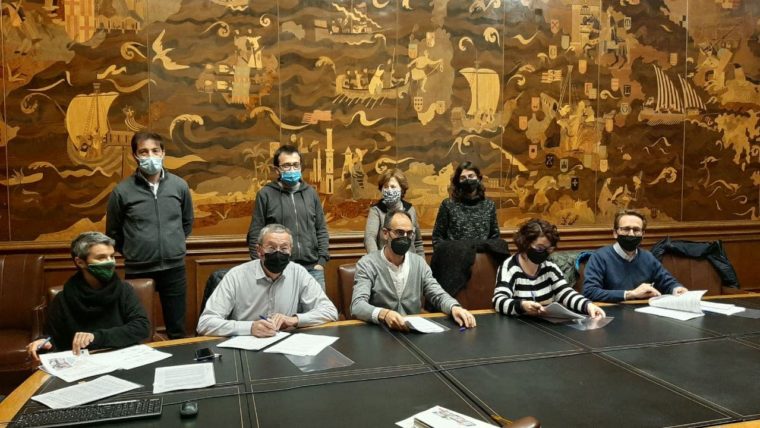A new impulse in the alliance between the Barcelona City Council and the non-profit housing sector

A new impulse for the public housing stock and collaboration with non-profit organisations. The Barcelona City Council has incorporated two new plots and a municipally-owned building into the agreement signed in 2020 with the Association of Social Housing Policy Managers (GHS) and the most representative bodies of the sector, the Coordinating Body of Social Housing Foundations (Cohabitac), the Network of Social and Solidarity Economy (XES) and the Federation of Housing Cooperatives of Catalonia, which plans the construction of around a thousand new apartments, 60% in rental regime and the remaining 40% allocated to cohousing initiatives.
This new incorporation will represent 203 more affordable homes from 2023 onwards, a figure added to the 11 developments of 364 homes already allocated to the organisations which are currently in pre-construction stages, such as drafting of projects and application for permits.
Specifically, these three new developments are:
- Casernes de Sant Andreu. Passeig de Torras i Bages 126-128. Cohousing of 80 apartments managed by a cooperative.
- Mont-ral 37 and 39 and Doctor Letamendi 99 and 103. Rental development of 38 homes managed by a foundation. These are buildings acquired by the City Council in early 2021 to halt a speculation process and with a long process of non-compliance with the duty of conservation by the previous proprietor.
- Bolívia 23-27. Rental development of 85 homes opened to both foundations and rental cooperatives.
An initiative to reinforce the non-profit housing sector
This agreement provides an impulse for social rental housing and for strengthening the social housing foundations and housing cooperatives to diversify the range of agents in the housing and real estate sector. The more powerful the non-profit sector, the more capacity there will be for creating affordable social housing, both in Barcelona and throughout the territory.
This formula also streamlines the enlargement of social housing stock by way of development and renovation. Being non-profit organisations, the processes of drafting projects and awarding works are not subject to lengthy tendering processes. In addition, the agreement regulates municipal control and transparency and guarantees that the ownership of the land and the buildings is 100% municipal and the assignment is made for a determined period of time (99 years).
Finally, this initiative also represents a powerful economic impulse. For the 1,000 apartments planned in the agreement, it is calculated that an investment of 150 million euros will be required, which may result in the creation of almost 1,600 jobs.
New improvements
The City Council and the organisations who signed the agreement in November 2020 agreed to introduce new improvements into it. In the first place, the possibility of increasing the municipal subsidy for the projects, until now limited to 7%, up to 16% for new constructions of no more than 15 homes and in all cases of properties to be renovated. This change will especially benefit singular projects like cohousing for senior citizens and persons with disabilities, all these developments being for fewer than 15 homes.
In the long term, the municipal investment in the form of these subsidies to the organisations will yield a return to future delegated-development projects. Once the organisations have repaid the credits assumed for the construction of homes, in addition to paying the rate, they will have to allocate 50% of the results of the operation to the Municipal Housing Institute or the body to be decided, which in turn will use those funds to finance new delegated housing developments.
In the second place, the agreement has also incorporated improvements in regard to the principles of transparency and objectivity in the procedure of selection and designation of projects and the beneficiary organisations, and in clarity in the application of technical solvency and the designation criteria.


